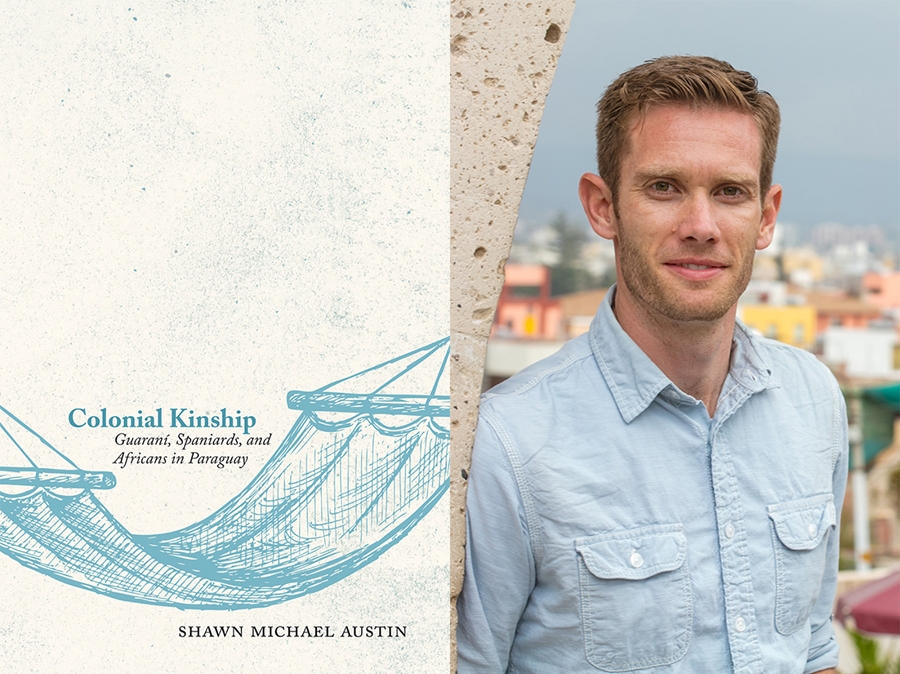Austin's New Book Looks at Indigenous, African and Spanish Interethnic Relations in Colonial Paraguay
A new book explores how the Guaraní of colonial Paraguay incorporated Spaniards into their kinship networks and then how Europeans modified those networks to introduce systems like the encomienda. Published by the University of New Mexico Press, Colonial Kinship: Guaraní, Spaniards, and Africans in Paraguay situates the Guaraní alongside Africans in an analysis of intercultural and interethnic relationships during the colonial period.
Professor Shawn Austin, the book's author, uses an ethnographic lens of analysis to trace the history of conquest and colonization in Paraguay during the 16th and 17th centuries. Emphasizing the social and cultural agency of Guaraní — one of the primary indigenous peoples of Paraguay — not only in Jesuit missions but also in colonial settlements and Indian pueblos scattered in and around the Spanish city of Asunción, Austin argues that interethnic relations and cultural change in Paraguay can only be properly understood through the Guaraní logic of kinship.
In the colonial backwater of Paraguay, conquistadors were forced to marry into Guaraní families in order to acquire indigenous tributaries, thereby becoming "brothers-in-law" (tovajá) to Guaraní chieftains. This pattern of interethnic exchange infused colonial relations and institutions with Guaraní social meanings and expectations of reciprocity that forever changed Spaniards, African slaves, and their descendants. While disease, Catholic evangelization, and Spanish labor demands collectively precipitated transformative social and cultural changes among the Guaraní, Austin demonstrates that Guaraní of diverse social and political positions actively shaped colonial society along indigenous lines.
Austin's work has drawn early praise, with professor Michael Huner of Grand Valley State University calling the book "an innovative, ethnographic-based reevaluation of Spanish colonialism in the province of Paraguay during the sixteenth and seventeenth centuries. [Austin] identifies that a Guaraní-derived sociocultural framework of cuñadasgo laid the foundation for the embattled colony's survival and proved a primary medium through which a wide spectrum of social relations in Paraguay evolved."
Austin is an assistant professor of history in the Fulbright College of Arts and Sciences at the University of Arkansas.
Topics
Contacts
Jim Gigantino II, chair
Department of History
479-575-7332,
jgiganti@uark.edu
Andra Parrish Liwag, director of communications
Fulbright College of Arts and Sciences
479-575-4393,
liwag@uark.edu
Headlines
PetSmart CEO J.K. Symancyk to Speak at Walton College Commencement
J.K. Symancyk is an alumnus of the Sam M. Walton College of Business and serves on the Dean’s Executive Advisory Board.
Faulkner Center, Arkansas PBS Partner to Screen Documentary 'Gospel'
The Faulkner Performing Arts Center will host a screening of Gospel, a documentary exploring the origin of Black spirituality through sermon and song, in partnership with Arkansas PBS at 7:30 p.m. Thursday, May 2.
UAPD Officers Mills and Edwards Honored With New Roles
Veterans of the U of A Police Department, Matt Mills has been promoted to assistant chief, and Crandall Edwards has been promoted to administrative captain.
Community Design Center's Greenway Urbanism Project Wins LIV Hospitality Design Award
"Greenway Urbanism" is one of six urban strategies proposed under the Framework Plan for Cherokee Village, a project that received funding through an Our Town grant from the National Endowment for the Arts.
Spring Bike Drive Refurbishes Old Bikes for New Students
All donated bikes will be given to Pedal It Forward, a local nonprofit that will refurbish your bike and return it to the U of A campus to be gifted to a student in need. Hundreds of students have already benefited.





